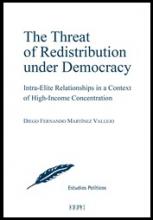
Abstract
Although an extensive literature states that, in contexts of wide inequality, democratic regimes force income redistribution from rich to poor, there is evidence in the opposite direction: democratic regimes can maintain and even accentuate inequality. This book asserts that the types of relationships the elites establish would explain why democracies are not necessarily effective in redistributing income. In the book, it is argued that the likelihood of redistribution will be less if economic elites establish cohesive relationships with the political and the military elites. Likewise, very close to Barrington Moore's thesis, this book also argues that the more cohesive the relationship between bourgeoisie and landowners, the more difficult it will be for democracy to survive in the event of redistributive threats. The argument presented here points out that high degrees of elites’ cohesion guarantees that the richest would have effective political representation in defense of their interests, as well as military protection against redistributive threats, even at the cost of democracy.
Diego
Martínez es máster y Ph.D. en Ciencia Política de la Universidad Autónoma de
Barcelona. Es también economista de la Universidad Nacional de Colombia y
filósofo de la Pontificia Universidad Javeriana, además fue investigadorvisitanteenformacióndoctoralporlaUniversidad Libre de Berlín. Las áreas deinterés de su investigación se centran en la economía política
comparada, la redistribucióndel
ingreso y los procesos de democratización y consolidación democrática en
condicionesde amplia desigualdad.
Diego Martinez holds a master’s and a Ph.D in Political Science from the Autonomous University of Barcelona. He was also a visiting scholar at the Free University of Berlin between 2015 and 2016. His current interests revolve around Comparative Political Economy, in particular the effects of both democratization and elites' relations on wealth inequality.
